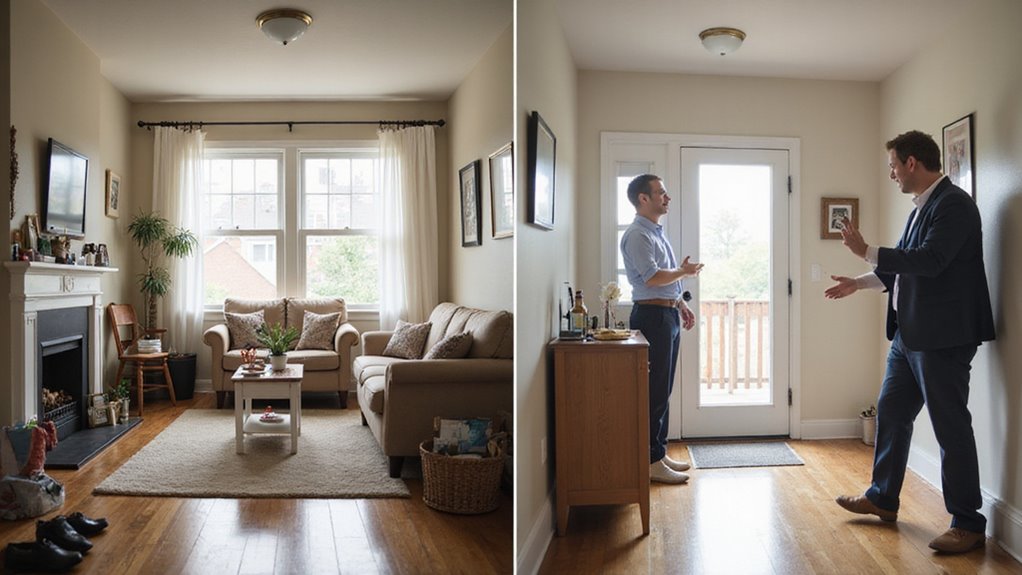Selling a rental property is very different from selling your primary home. Many people do not realize that rental property sales involve extra rules and taxes. If you are not careful, you could end up paying more than you expected.
These extra rules can be tough to navigate. You must worry about things like depreciation recapture and tenant rights. IRS regulations and disclosure requirements can make the process confusing and stressful. But you can avoid costly mistakes if you know the differences.
Selling a rental property usually leads to more taxes and legal steps than selling your home. Understanding the rules can help you keep more money from your sale. This blog will show you the key differences and help you sell your rental property with confidence.
Key Takeaways
- Selling a primary residence may qualify for capital gains tax exclusion, while rental property profits are usually fully taxable with depreciation recapture.
- Rental property sales require disclosure of tenant leases and rights; primary residences focus on property condition and standard disclosures.
- Staging and marketing are easier with owner-occupied homes, while tenant-occupied rentals need legal notice and cooperation for showings.
- Reinvesting proceeds from a rental property can defer taxes via a 1031 exchange, an option not available for primary residences.
- Owners of rental properties often use LLCs for asset protection, but primary homes are typically held in individual or joint names.
Understanding Ownership Types

Ownership types affect your legal rights and responsibilities. They also determine how you can sell or transfer your property. Knowing your ownership type is important before making any decisions.
If you own a rental property in your own name, you are personally responsible for debts and claims. Using an LLC or partnership can protect your personal assets. Many investors choose these legal structures for extra safety. If you need to sell your house without an agent, understanding your ownership type is crucial for following the right process.
Primary residences are usually owned by one person or jointly by two or more people. These homes are rarely held in a separate company name. Always check your property deed to confirm who the legal owner is.
If you understand your ownership type, you can follow the correct rules when selling. This helps you avoid legal problems and makes the sale process smoother. Always review your agreements for accurate information.
When selling a property, it’s important to consider whether listing it as-is could save you time and money depending on your financial situation and property condition.
Tax Implications and Capital Gains
When you sell a property, the IRS treats capital gains differently depending on whether it’s your primary residence or a rental. You’ll need to consider the capital gains exclusion, depreciation recapture tax, and the potential for a 1031 exchange. Understanding these rules lets you optimize your tax liability and maximize net proceeds.
It’s important to note that the primary residence exclusion allows homeowners to avoid taxes on up to $250,000 (single) or $500,000 (married filing jointly) of profit if they meet certain residency requirements. If you’re selling a rental property, you may need to navigate additional complexities such as depreciation recapture and may benefit from solutions offered by professional home buyers who can assist with tax problems and liens.
Capital Gains Exclusion Rules
The IRS taxes capital gains from selling your home and rental property differently. If you sell your main home, you may exclude up to $250,000 of profit from taxes, or $500,000 if you are married filing jointly. You must have owned and lived in the home for at least two out of the last five years to qualify.
Rental properties do not qualify for this home sale exclusion. Profits from selling rental property are usually fully taxable. If you want to delay paying taxes on rental property gains, you can use a 1031 exchange.
Tax rules for real estate sales can affect your investments. If you plan carefully, you may keep more profit and grow your portfolio. Always consider these rules when making decisions about selling property.
Depreciation Recapture Tax
Depreciation recapture tax is an extra tax you pay when selling a rental property. The IRS allows you to take yearly depreciation deductions. If you sell, you must pay tax on those deductions.
The IRS taxes the part of your profit from depreciation at up to 25%. This rate is higher than regular capital gains tax. The rule applies even if you did not claim the depreciation but were eligible.
Rental properties are different from primary homes for this tax. You must calculate how much depreciation you claimed or could have claimed. Plan for this tax when figuring out your profit from the sale.
1031 Exchange Opportunities
A 1031 exchange lets rental property owners delay paying capital gains taxes. Owners do this by buying another similar property with the sale money. This rule is found in Section 1031 of the tax code.
If you want to keep growing your investments, a 1031 exchange can help. You can use your profits to buy new property without paying taxes right away. This gives you more control over when and where you invest.
You must follow strict IRS rules for 1031 exchanges. These include deadlines and rules on what types of property qualify. If you miss a rule or deadline, you might lose the tax benefit.
The Role of Depreciation Recapture
Depreciation recapture is a tax rule that affects you when you sell a rental property. The IRS taxes the part of your gain that comes from depreciation. This tax can reduce the money you keep after the sale. When calculating this tax, it’s important to understand that proper documentation of past depreciation, much like keeping records of asbestos presence when selling a house, can help ensure accurate reporting and compliance.
Depreciation recapture only applies to the amount you claimed or could have claimed. The tax rate for recapture is different from the capital gains rate. If you kept careful records, you can make sure the tax is calculated correctly.
Property owners should consider ways to lower their recapture tax. If you plan ahead, you may reduce what you owe. A tax advisor can help you find legal strategies to minimize this tax.
It’s also important to review contract terms before selling, as specific rules may affect your ability to transfer ownership and impact your overall tax situation.
Emotional Considerations in the Selling Process

Emotional considerations can strongly affect your experience when selling a property. Feelings often shape your decisions and satisfaction with the sale. If you understand these emotions, you can make better choices.
Selling your main home often brings strong emotional ties. Memories and the feeling of “home” can raise your price expectations. These emotions may make it harder to negotiate or accept offers. Working with a family-owned local business can help ease some of the emotional stress during this process.
If you are selling a rental property, emotions usually play a smaller role. Owners often focus on numbers like cash flow or return on investment. This can help you make more objective decisions.
If you notice your emotions are affecting your decisions, you might want to seek advice from a real estate professional. Recognizing these feelings early can help you stay on track. It can also lead to a more satisfying sale experience.
It’s important to remember that foundation issues can also impact your property’s value and the speed of your sale, making objectivity even more crucial during the process.
Tenant Rights and Lease Agreements
When selling a property with tenants, you must follow legal and contract rules. These rules are different from selling your main home. State and local laws protect tenant rights during a sale.
Lease agreements often list rules for notice periods and showings. Landlords must follow these terms to avoid legal problems. Failing to comply can delay or stop the sale. In some cases, selling to a trusted home buyer can make the process easier, as they may be experienced in working with tenant-occupied properties.
Lease agreements set rules for notices and showings—landlords must follow them or risk delays and legal issues when selling.
You should read all lease agreements before listing the property. If unsure, consult local laws or a lawyer. Buyers may want to keep tenants, so check their interest.
Always tell tenants your plans and expected timelines. Early and clear communication can help avoid disputes. If tenants must leave early, make sure the lease allows it.
It is also important to determine if co-ownership arrangements affect your ability to sell, as all owners listed on the deed must generally agree to the sale.
Preparing the Property for Sale

Before you list your property, check for any repairs or problems that could lower its value. Fixing these issues can help your property look better during market analysis. A well-prepared property often attracts more buyers.
Rental properties should be cleaned and any tenant damage repaired. Update light fixtures and make sure all appliances work. If you take these steps, your property will seem well-maintained.
For homes you live in, focus on staging. Remove personal items and arrange furniture to show off the space. This can make your home feel larger and help buyers imagine living there.
Simple improvements like fresh paint, neat landscaping, and good lighting can increase buyer interest. Choose updates that match what current buyers want. If you follow market trends, you may sell faster and for a better price.
If you want to avoid the hassle of repairs and showings, consider working with reliable buyers who purchase homes as-is and handle all the closing details for you.
Disclosures and Legal Requirements
You must meet all disclosure and legal rules when selling your property. These laws help prevent disagreements and delays during the sale. If you do not follow them, you may face fines or lose the sale.
Selling a rental property is more complex than selling your own home. Buyers need to know about leases and property issues. You must give honest and clear details about the property’s condition and any tenants. Working with a family-owned local business can make this process easier and more transparent for both sellers and buyers.
Sellers should share the details of any current leases with buyers. Property disclosures should include repairs and any hazards. If required, provide tenants’ rights documents and all federal forms, such as those for lead-based paint.
It’s important to work with trusted local title companies to ensure all legal and paperwork requirements are handled properly during the sale.
Timing the Sale for Maximum Benefit

To get the most money from selling your property, you should choose the right time to sell. Property prices often go up in spring and early summer when more buyers are looking. If you sell during these months, you may get a higher price. Selling your property in spring or early summer can help you get a higher price due to increased buyer demand.
You should check recent sales of similar homes in your area. If prices are rising, it could be a good time to sell. Historical sales data can help you spot these trends. Sellers should also be aware of capital gains taxes, which may affect your net profit depending on how long you’ve owned the property and your personal tax situation.
If you own a rental property, check when tenant leases end. A vacant home might attract buyers who want to move in right away. If a lease is ending soon, you could list the property then.
For your main home, consider your personal needs. If you need to move for work or school, these can affect your timing. Aligning your sale with both market and personal factors can increase your profit.
If you’re looking for a fast and hassle-free option, selling to cash home buyers can help you close quickly and avoid repairs, commissions, and lengthy traditional processes.
Marketing Strategies for Each Property Type
Each property type needs a specific marketing strategy to attract the right buyers. Primary residences require emotional appeal and staging to help buyers picture living there. Rental properties need a focus on financial data, tenant history, and location.
Professional staging helps primary homes sell faster if you want quick results. Investors care more about cash flow and occupancy rates, so highlight these details if marketing a rental. Clean and neutral visuals work best for rental listings.
High-quality photos and virtual tours improve any listing. If you know your target buyer, choose the right marketing channels, such as social media or investor networks. Emphasize lifestyle features for homes and financial returns for rentals.
Handling Occupancy During Showings

Occupancy affects how easily buyers can see your property. If your home is owner-occupied or vacant, you can schedule showings more freely. This flexibility lets you stage the home better and attract more buyers. Owner-occupied or vacant homes offer greater flexibility for showings, making it easier to stage and attract more potential buyers.
Staged homes often sell faster and for higher prices. The National Association of Realtors reports that staged properties sell 88% faster and for 20% more than unstaged homes. If you want quicker results, consider staging and keeping the home ready for showings.
Rental properties with tenants are harder to show. You must follow lease terms and give proper notice before entering the unit. If tenants are flexible, you might be able to schedule more showings.
Good communication with occupants is important. Offering small incentives can encourage cooperation. A clean and tidy property will help attract more buyers and reduce time on the market.
Calculating Return on Investment
To figure out your return on investment (ROI) from selling a property, you must compare your costs and profits. Start by adding up your purchase price, closing costs, and any money spent on improvements. Then, subtract all your expenses from the final sale price.
If you sell during a strong market, you can earn more from your property. If the market is weak, your profit may decrease. Always consider the timing of your sale.
You should also subtract transaction fees, agent commissions, and other costs from your profit. The result will show your true ROI. This clear calculation helps you make better financial decisions.
Impact on Financing and Mortgage Payoff
When you sell a rental property versus a primary residence, you’ll encounter distinct mortgage payoff procedures and must account for possible prepayment penalties, which can vary by loan type. Lenders often require specific notifications and documentation to process the release of the lien efficiently. Understanding these financial mechanics ensures you minimize costs and avoid delays at closing.
Mortgage Payoff Process Differences
The mortgage payoff process for rental properties is different from primary residences. Lenders have extra requirements for rentals because tenants live there. They need to make sure all agreements and issues are clear before releasing the title.
Rental properties often need inspections to verify tenant units are safe. Buyers and lenders want to know the building meets all rules. If the property fails inspection, the final payoff amount could change.
Lenders may ask for documents showing lease and tenant agreement details. Escrow steps may change depending on if the property is vacant or occupied. Title release can depend on tenant cooperation and agreement status.
You must plan the mortgage payoff to match the closing date. All debts, fees, and escrow balances should be settled before closing. If you follow these steps, the payoff process can go smoothly.
Prepayment Penalties Considerations
Prepayment penalties can reduce how much money you get from selling your property. These are fees you pay if you pay off your mortgage early. You should check your mortgage terms before selling.
Lenders often charge these fees in the first three to five years of your loan. Investment property loans usually have tougher prepayment rules than loans for your home. Some lenders may charge up to 2% of what you still owe.
Always review your payoff statement to see if you have a prepayment penalty. If you include this cost in your planning, you can better estimate your profits. This helps you choose the best time to sell.
Lender Communication Requirements
Clear and timely communication with your lender is essential when selling any property. Lenders need updates to process mortgage payoffs and handle liens. Delays or miscommunication can slow the sale or increase costs.
You should tell your lender early if you plan to sell your home. Request a payoff statement and check for any extra interest owed. Confirm what steps are needed to remove the lien after the sale.
If the buyer needs a loan, your lender will review their approval. The lender also helps set up the appraisal, which affects the closing date. If you do not coordinate these steps, the sale may face delays.
Reinvestment Options After the Sale
After selling your rental property or home, you need to choose where to reinvest your money. Good reinvestment can help you reach your financial goals and reduce taxes. You should look at your options carefully before making a decision.
If you owned a rental, you might use the money to buy another property. You could try a bigger building or a different location. Always check new leases and look for ways to manage the property more easily.
Homeowners may want to spread their money across different types of investments. You can put money in stocks or retirement accounts for more growth. Each choice has different risks and ways to access your money.
The table below gives a simple overview of some options:
| Option | Risk Level | Liquidity |
|---|---|---|
| Real Estate Exchange | Moderate-High | Low |
| Stock Market | Moderate | High |
| Retirement Accounts | Low-Moderate | Moderate-Low |
You should match your reinvestment to your goals and comfort with risk. If you are unsure, talk to a financial advisor. Decisions now can affect your future financial health.
Working With Real Estate Professionals
You need a real estate agent with a proven track record in your property type to optimize pricing and minimize time on market. An experienced professional helps you interpret complex disclosure obligations, fair housing laws, and local regulations. Data shows that expert guidance reduces legal risks and increases net proceeds for both rental and primary residence sales.
Choosing the Right Agent
A good real estate agent makes buying or selling easier. You should pick someone who knows your type of property well. The right agent can help you avoid mistakes and get better results.
If you want the best outcome, choose an agent with experience in your market. The agent should understand prices and timing in your area. They must know how to use market data to set the right price.
Look for agents who use strong data and clear pricing strategies. Good agents can spot market trends and explain what they mean for you. If you hire someone with good negotiation skills, you may save money or get a higher sale price.
When choosing an agent, check their track record with properties like yours. If they have proven results, you can expect a smoother process. Always select someone who listens to your needs and puts your goals first.
Navigating Legal Requirements
You must follow legal rules when selling a rental or primary home. These rules help protect both the seller and buyer. If you ignore them, you may face legal trouble or lose money.
If tenants live in the property, check all lease agreements first. State or local laws may set notice periods or tenant rights. Your real estate agent should help you understand these rules.
Sellers must disclose known problems with the property. These problems might include needed repairs or environmental dangers. Missing a required disclosure can lead to lawsuits after the sale.
Data from the National Association of Realtors shows that disclosure issues often cause legal disputes. Protect yourself by meeting every legal requirement. If you are unsure, ask your agent or a lawyer for help.
Conclusion
If you plan to sell a rental property, you will face different rules than selling your home. You may deal with taxes, depreciation, and tenant issues. If you do not understand these, you could lose money.
If you want to avoid complicated processes, we buy houses for cash in any condition. You can sell your property quickly without worrying about repairs or real estate agents. If you choose this option, you can save time and reduce stress.
If you want a smooth sale, we at Freedom Path Investors are ready to help. We make offers fast and handle all the details. Contact us today to learn how we can buy your house for cash.







